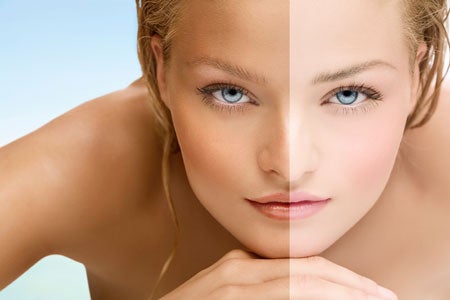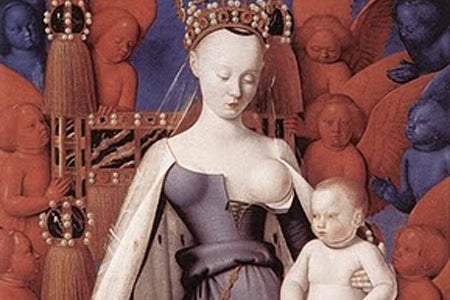All racist overtones and issues of civic equality aside, the question begs to be asked, “Is being whiter better?” In all seriousness, there has been (and still is today) a sometimes not so subtle emphasis placed on being white throughout history, and spanning across cultures, especially in regard to feminine beauty.
First, let’s look at cultures that would glorified “white” or “whiteness”. The ancient Greeks and Romans placed an emphasis on pale skin, making use of chalk or other forms of makeup in order to lighten their skins. Beautiful women were more often than not described as “white as milk” or some other variation on pale, fair skin. Here is the image of Agnès Sorel (d. 1450), the favorite mistress of Charles VII, of France, known for her beauty, shown in this luminous, white image as a Madonna.
Victorian era Europe saw women using lead-based paint to make their skin pale, and to accent their veins in order to give the illusion of nearly translucent skin. They covered their bodies and used parasols if they had to go out into the sun. Only in the past hundred years has sun-tanned skin come into vogue as a fashion statement, and that pertains nearly exclusively to women who are already white.
Next, let’s look at non-white cultures that place a seemingly unnatural emphasis on whiteness. In the past fifteen years, modern India has seen the emergence of a rash of skin whitening creams. One easily found example is Pond’s “White Beauty” campaign; a series of ads in which a woman regains her ex’s affection through whitening her skin.
The woman is former Miss World Priyanka Chopra, who was hardly dark skinned to begin with. There is even a Thai version of this commercial, so it is evident that the emphasis on whiteness in Asia is not limited to the Indian subcontinent. Even Japanese pop culture is inundated with images of whiteness, heavily slanted towards females.
Historically, Egypt saw a similar trend during the early parts of the twentieth century. Soaps, creams, treatments, all designed to make Arab women whiter. Soap from the Nablus region of Palestine is reputed to be some of the highest quality soap in the world, yet Middle Easterners were switching to abrasive soaps merely to have fairer skin.
Keep in mind that early attempts to make themselves appear whiter were quite dangerous for women. Arsenic or lead-based makeup undoubtedly led to countless deaths. Now, on the other end we’ve seen the harmful effects of over-tanning in the growth of skin cancer, and few people would call unnatural tanning methods safe or even sane.
Why has human society placed such an emphasis on the element of whiteness in regards to feminine beauty? Is it a trend that will soon go the way of the medieval perception that being slight overweight signified a high social standing? Is whiter better? If so, how do you explain the paradox of white people placing such an emphasis on being dark skinned (ie. tan)?
A Cameron


